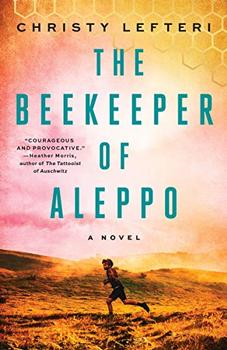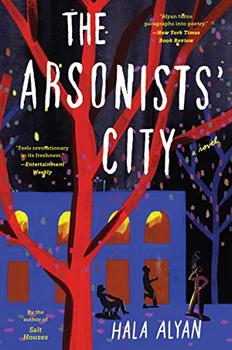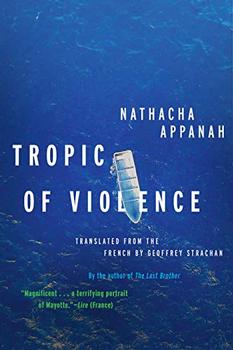Summary | Excerpt | Reading Guide | Discuss | Reviews | Beyond the book | Read-Alikes | Genres & Themes | Author Bio

A Novel
by Christy LefteriIn Christy Lefteri's sophomore novel, The Beekeeper of Aleppo, the author introduces readers to Syrian refugee and former beekeeper Nuri Ibrahim as he waits in England with his wife, Afra, to find out if they'll be granted asylum. Nuri's first-person narration relays what their lives are currently like, and through flashbacks readers are told Nuri's life story – about his boyhood in Syria, his partnership with his cousin Mustafa in a bee-raising enterprise, his experience of war in his homeland, and finally the difficult and harrowing journey to safety. Nuri's recollections proceed more or less chronologically, with the majority focusing on the challenges the couple faced trying to get to England; in particular Nuri recounts the appalling experiences he and Afra, like many, endured while waiting (with little hope of relief) in Greek refugee camps en route to Western Europe.
First-person narrative can be difficult to pull off effectively, since it can limit a story to one perspective, thereby making it feel one-sided. Lefteri neatly bypasses this trap by having her protagonist tell readers about the people he's met in his travels, most of whom are likewise fleeing their homes (but for widely differing reasons) and who experience being refugees in distinct ways. Thus, Nuri's in-depth account of his own life is complemented by snippets of others' experiences, creating a more nuanced picture.
The author deftly integrates these accounts with the main plotline, keeping them from feeling like stand-alone short stories. For example, while waiting for assistance in traveling to England at a refugee camp in Athens, Nuri hears music and finds a man playing a stringed instrument called a rebab. Upon being approached, the man first tells Nuri he left Afghanistan because the Taliban forbade his music, but later reveals he had been forced to join the Ministry of Defense where he was required to kill civilians. Later, Nuri's cousin Mustafa, who is waiting elsewhere for asylum, writes in a letter about one of the other refugees he's encountered:
I know that every other person here is trapped in their own hell – there is one man who holds his knees and rocks himself all through the night, and he sings, Nuri. He sings a lullaby that freezes my heart. I want to ask him who he once sang it to, or who it was that sang it to him. But I am afraid of his answer, and so I offer him cigarettes instead, it's all I can do, because he stops singing for a few minutes while he smokes.
In the Athens refugee camp, Afra befriends one young mother who has been driven insane by the theft of her infant, pulled from her arms while she slept in the refugee camp. Heartbreakingly, some other refugees the main characters encounter are so damaged by what they've been through that they can't even speak about what has happened to them.
There is so much heartbreak and sadness wrapped up in this novel that it's tempting to dismiss it as an overwrought work of fiction, but Lefteri knows the experiences chronicled here are just a few examples of what thousands of people around the world undergo on a daily basis. As a volunteer at a UNICEF-sponsored refugee center in Athens she witnessed the great level of suffering that plagues so many from war-torn nations seeking asylum. Her strong grasp on storytelling keeps the tale moving, though, preventing it from getting mired in tragedy, and her characterization is definitely a highlight; every single person Nuri describes comes across as real, even if his encounter with them is transitory.
Immigration and the plight of refugees headline the news in many nations, and to avoid complacency it's key for those of us with stable lives to read about those who aren't as fortunate. The Beekeeper of Aleppo is a great starting point for those interested in learning about the worldwide refugee crisis; it's an exceptionally well-written novel, if heartbreaking. Book groups in particular will find many points to fuel discussion, especially about the current challenges faced by those seeking to escape countries with repressive regimes and ongoing civil conflict.
![]() This review was originally published in The BookBrowse Review in September 2019, and has been updated for the
June 2020 edition.
Click here to go to this issue.
This review was originally published in The BookBrowse Review in September 2019, and has been updated for the
June 2020 edition.
Click here to go to this issue.

If you liked The Beekeeper of Aleppo, try these:

by Hala Alyan
Published 2022
A rich family story, a personal look at the legacy of war in the Middle East, and an indelible rendering of how we hold on to the people and places we call home.

by Nathacha Appanah
Published 2020
A potent novel about lost youth and migration by the author of The Last Brother and Waiting for Tomorrow.
Your guide toexceptional books
BookBrowse seeks out and recommends the best in contemporary fiction and nonfiction—books that not only engage and entertain but also deepen our understanding of ourselves and the world around us.